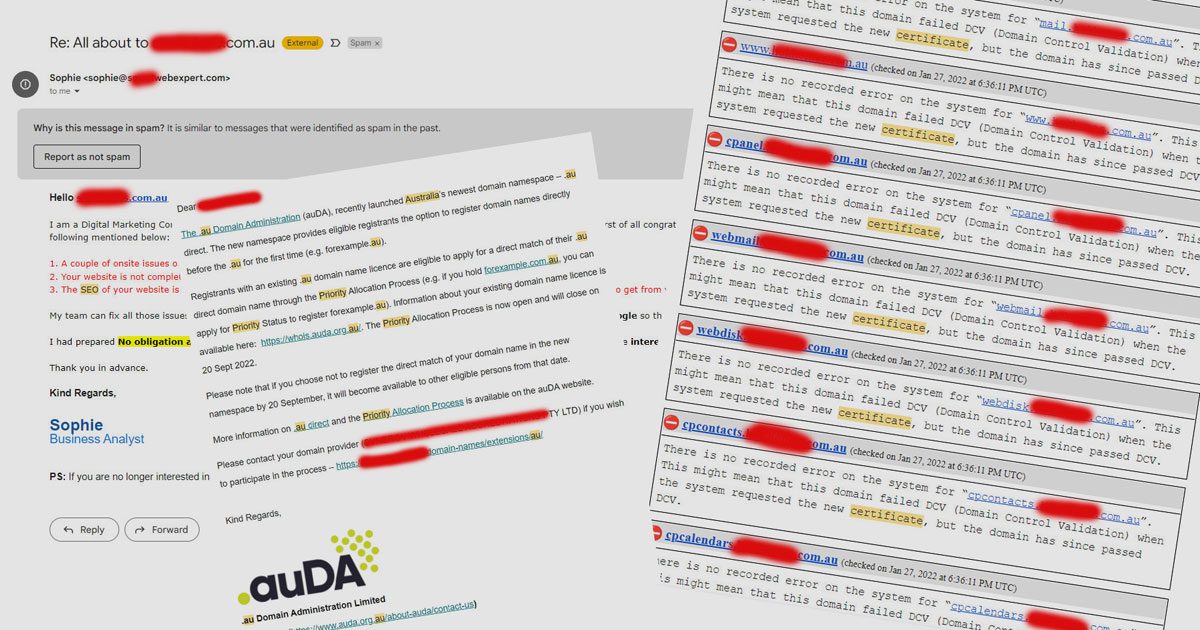In recent weeks, there have been three alarming emails that small business website owners have been receiving and, thankfully, forwarding to us for guidance.
They involve the following issues:
- SSL certificates being down
- Time running out for claiming your .au domain name
- Magical SEO services that will fix errors in your website
There's a common sense approach to each of these emails, so let's take a quick waltz through them.
If you prefer video, I have whipped up a 7-minute piece that you can play, covering the same points. It's below.
Your SSL certificate is down or broken
This is an email that is designed to cause alarm, with its harsh language and garish use of heavy, read icons and imagery.
The whole email exudes a sense of danger.
However, it is a "dumb" email that is spat out by cpanel webhosting software if there's even a millisecond gap between the expiry of your SSL (security) certificate and the regeneration of a new one.
This little process happens every month but every now and then there is a tiny gap in the changeover, resulting in the email that reminds me of the robot in Lost In Space, which would declare, "danger, Will Robinson".
The simple step to take when you get such emails is to go and look at your website in a browser.
In the top left of the browser window, next to your website address, is there a closed padlock? If there is, your site is all good. If there is a broken padlock or a big red warning mark, then it means you do need to talk to your website host about checking your SSL certificates.
I hope that empowers you to deal with such emails.
Time running out for claiming your .au domain
The auDA domain registration authority, which manages domain names with a .au at the end, has created a new Top Level Domain or TLD in which you just add the .au after your domain name without needing a .com or a .org or a .net, etc.
Personally, I think this shows the boredom in the worlds of our tech people (god bless them), that they needed more busy work.
Of course, it also creates new income streams.
However, in doing so, it also creates yet another stressor for businesses who want to keep themselves safe from the cheats and lazy scammers who like buying domain names that look like (or "pass off" as) proper websites, in the hope of tricking hapless internet users into their password and identity-stealing schemes.
Current minimum best practice is to register both the .com and .com.au versions of your domain name so that such scoundrels cannot take the one you missed and build a site that "looks" like yours and hoodwink innocent visitors by pretending to be you. Now, we need to add the .au to the "must have" list so that we are protected.
I doubt it will be a long time before consumers automatically add just the .au to a business name to check if they're online, so my advice is to get the .au and just redirect it to your current, dominant web address, until we see if it catches on.
The deadline for priority registration for people already with a .com.au is September 20, 2022.
At the time of writing, VentraIP is doing .au domains for a discounted price of about $9 a year for a maximum of five years. Makes sense to grab five years worth and be done with it for a while.
Tip: If you're happy with your current web host or domain registrar, just start the process of registering your .au address through them, and in the process they will point you to the auDA priority form which will send you some special codes to prove you are eligible.
Magical SEO services - the bane of small business website owners
We've all seen them, or thousands of them.
The badly written, often pushy emails that alert us to some problems stopping our site from being high in Google.
Sometimes they start with a bit of false praise, before telling you how they've created a report to send us with some no obligation recommendations.
Remember this: They are lying through their teeth. They have never seen your site. Their little web crawler has spat your website into their spam machine (sometimes even quoting a line or two) and they're just playing a numbers game.
If you bite, you're gone. Get ready for a tirade of pesky follow ups.
If you pay for an SEO service from any of these types of companies, you'll find extra words "stuffed" onto pages in the hope of tricking Google, and lots of links to your website "magically" appearing from some of the dodgiest, flimsy, link farm pages on the internet.
Typically, this activity will harm your reputation and rankings, not help.
So, simply ignore such emails and if something has gotten under your skin, talk to us or your preferred and trusted marketing advisor to investigate.
The video version of this blog is below.

